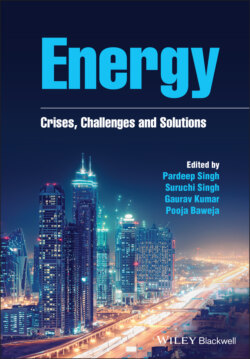Читать книгу Energy - Группа авторов - Страница 9
Оглавление
Preface
Energy is an indispensable component of every aspect of development, wealth, health, nutrition, infrastructure, and education. Energy is a necessary element in development that should be a fundamental right. Many development indicators are strongly related to per‐capita energy consumption. The economic development of many countries has come at the cost of the environment. It should not be presumed that a reconciliation of the two is not possible. There is a need to take enhanced global actions to address emission problems.
Fossil fuel is the most conventional energy source, but its usage is full of dichotomy as its utilization has increased during economic development, but that also increased greenhouse gas emissions. Also, fossil fuel conservation will include finding a way to tap into the Earth’s supply so that the commonly used oil fields are not drained completely. What will pave the way for natural recovery? The depletion also creates an enormous destructive waste product that then impacts the rest of life. The nexus concept is the interconnection between energy, water, food, land, and climate. Such interconnections enable us to address trade‐offs and seek synergies among them. Putting pressure on one component will affect other components as well. Energy, water, food, land, and climate are essential resources of our natural environment and support our quality of life. Competition between these resources is increasing globally and is exacerbated by climate change. Improving resilience and securing resource availability would require improving resource‐use efficiency.
Many policies and programmes are announced nationally and internationally to replace the conventional mode and emphasize the conservation of fossil fuels and reuse of exhausted energy, so a gap in implications and outcomes can be broadly traced by comparing the data.
The book ‘Energy Crises, Challenges, and Solutions’ aims to highlight problems and solutions related to conventional energy utilization, formation, and multitudes of ecological impacts and tools for the conservation of fossil fuels. The book also discusses modern energy services as one of the sustainable development goals and how the pressure on resource energy disturbs the natural flows. The book covers holistic issues related to energy and its contribution in triggering climate change and replenishing fossil fuel, emphasizing fossil fuel conservation and thus nature recovery. The compilation also highlights direct and indirect implications on different sectors. Many policies and legislations have been documented, but still, energy‐related problems cannot be checked. This book helps identify these gaps, especially in the developed region. It benefits researchers and all other sectors and stakeholders, students, industries, and governmental agencies directly or indirectly associated with energy research.
We are highly delighted and express our gratitude to all the authors for their outstanding cooperation towards the compilation of this book. We also extend our sincere thanks to all the reviewers for their valuable suggestions and comments, which have helped us tremendously prepare this book. We also thank Wiley Publication, Andrew, Rosie, and Shiji for their generous support and efforts.
Editors
Pardeep Singh, Suruchi Singh, Gaurav Kumar, and Pooja Baweja
